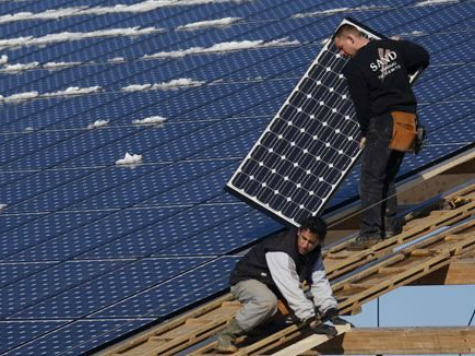Now that Barack Obama has been reelected, the MSM feels free to criticize him, including the giant investment his administration made during its first term to green tech companies that failed then or are failing now.
In a report on 60 Minutes, Lesley Stahl finally woke up to that fact, pinning down Vinod Khosla, a billionaire from his Silicon Valley investments, “known as the father of the Cleantech revolution.” Khosla was the recipient of federal largess to help him in his bid for gasoline made from wood chips.
Stahl also spoke with former undersecretary to the Energy Department Steven Koonin, who signed off on dozens of government aids to emerging start-ups in the clean energy field; and Pin Ni, a Chinese man who owns the autoparts company Wanxiang and has bought numerous failed clean-tech companies that were subsidized by American tax dollars.
Stahl noted that Obama created more than $100 billion in loans, grants, and tax breaks to clean-tech, then shifted to an interview with Khosla about his bio-fuel company, KIOR. Khosla stated, “The crude is created through a thermo-chemical reaction in seconds. And by using wood instead of corn, this biofuel doesn’t raise food prices which was a concern with ethanol. It smells like crude, it works like crude, except it’s 100 percent renewable. Then it’s distilled onsite into… clean green gasoline.”
Stahl commented, “You make it sound almost – sorry – too good to be true. There must be a downside.” Khosla responded, “There is no downside.”
Stahl then noted: “Well, there is. First off, his clean green gasoline costs much more than what you pay at the pump. And despite hundreds of millions of dollars invested – including $165 million of Khosla’s own money – KIOR is still in the red; and the manufacturing is so complex, it is riddled with delays.”
She then turned to Koonin, who busted Khosla, saying of the Silicon Valley group championing clean-tech investment, “I think they saw it as a technical opportunity, thinking that the people in energy are just troglodytes, and they don’t understand what they’re doing… managing risks that have to do with market, with supply, with operation, with regulation. And in the end, hoping that you get returns on a 20 or 30-year time scale.” When Stahl protested, “Yeah, but they must’ve known they weren’t going to get a payoff for 20 or 30 years,” Koonin riposted, “I don’t think they understood that. The average venture capitalist likes to get in and out in about three to five years.”
Stahl noted that the federal government has invested more than one hundred million dollars in Khosla’s various clean-tech ventures, with several states chipping in more hundreds of millions. Then she turned to Robert Rapier, a chemical engineer specializing in Biofuels, who bluntly asked, “Vinod Khosla is very smart, but would you let him operate on your heart?” He continued, “He set up a system where he overpromised and under-delivered, and so the public and the politicians all developed unreasonable expectations… in the field of advanced biofuels, he has not done very well. The companies that he’s brought out are in trouble. Their share prices are down 80, 85 percent.”
Turning back to Koonin, Stahl asked, “The government spent about $150 billion into these innovations, taxpayer dollars – money well spent?” Koonin answered, “I think there are significant developments that have come out of that spending that impact our energy system now, new technologies demonstrated. I think it was good value for the money.” When asked about the numerous clean-tech companies that failed, Koonin said, “I put some of the major blame on the government, both the executive branch and Congress, for an inability to set a thoughtful and consistent energy policy.”
Stahl queried, “You were the government. How many of the loans were you involved in?” Koonin: “Difficult to know the exact number. But I would say in the order of 30.” She countered, “Part of this was supposed to be creating new jobs. Everything I’ve read [said] there were not many jobs created… so what went wrong there?” Koonin answered, “I didn’t say it would create jobs. Other people did… I didn’t think it mattered as… job creation, no.”
Stahl concluded, “So, is clean-tech dead?” Koonin admitted, “There are parts of it that I would say are on life support right now.”
Finally, Stahl went after Pin Ni and admitted something the Obama Administration seems loath to admit. She asserted, “Clean-tech was dealt a hammer blow by this: plentiful, inexpensive, and relatively clean domestic natural gas. So by 2012, the moneymen of Silicon Valley were dropping energy from their portfolios, and soon struggling and bankrupt clean-tech companies were on the auction block at firesale prices.”
Stahl said to Ni, “A lot of the companies that you have bought in the clean-tech area got a lot of federal subsidies… There’s something that just doesn’t feel right about a Chinese company coming in and scooping it all up after the taxpayers put so much money into it.”
Ni responded, “My answer will be: Do we like the capitalism or not? If we do, that is the capitalism.” He added when pressed that clean-tech is not going well.
Stahl commented to him, “You understand the suspicion around you, this company, that you’re here just to take our high-technology, you know, and get it back to China as fast as you can?”
Ni answered, “I’m not the president of China. I’m the president of Wanxiang America, right? So whatever we do has to benefit us. We are here to conduct business. We are here to make money.”
When it’s conveniently timed, the MSM will criticize Obama and his buddies. Just don’t expect it in election season.

COMMENTS
Please let us know if you're having issues with commenting.